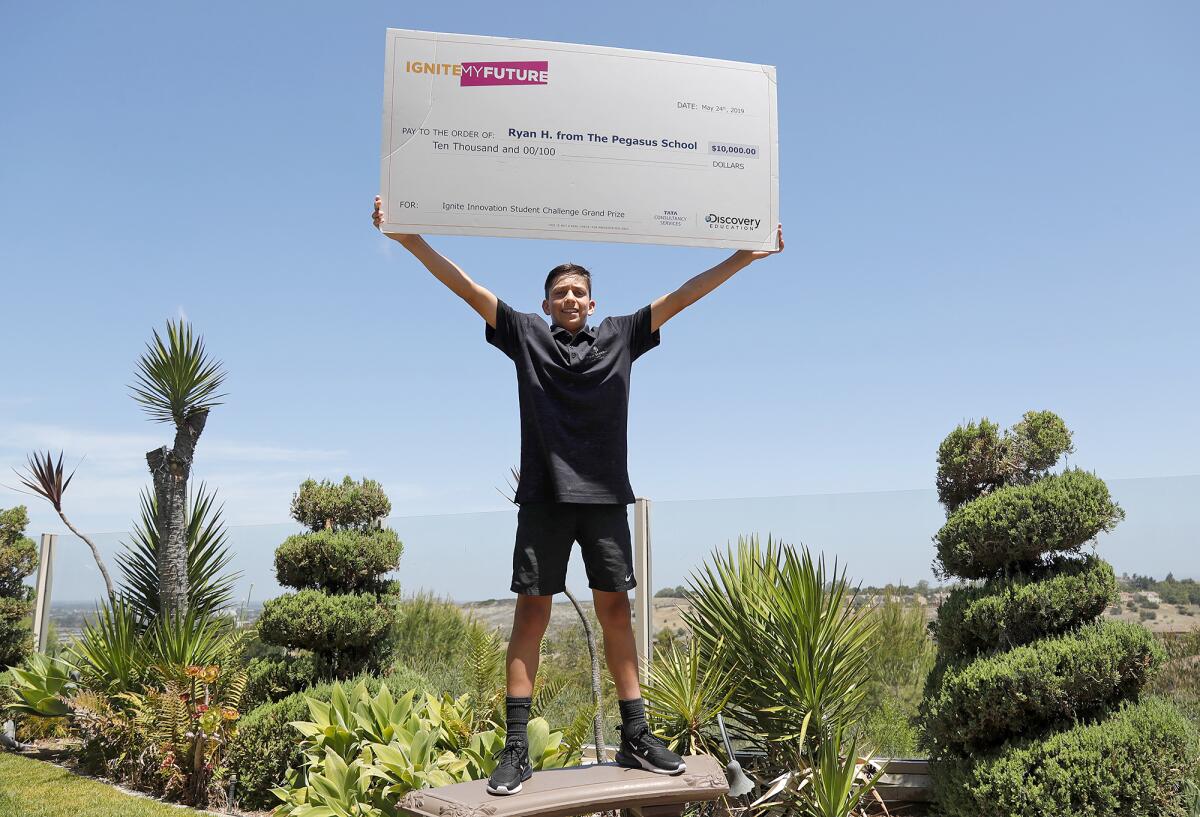The Pegasus School’s Ryan Honary, 13, launches a startup company

How many 13-year-olds do you know who are the brains behind a startup company?
If you know Newport Coast resident Ryan Honary, the answer is at least one.
Ryan, a seventh-grader at The Pegasus School of Huntington Beach, helped launch “SensoRy AI” this week.
The goal is to utilize artificial intelligence to prevent and predict hazards that threaten natural resources, he said. The startup company is the culmination of more than two years of work for Ryan, who thought of using a network of sensors with wireless mesh networking designed to operate in remote and fragile environments.
The sensors can be deployed at high-risk locations, he said, to enable early detection of things like wildfires or leaks.
“I believe that it’s very important for my generation to actually use their brains and solve the environmental problems once and for all,” Ryan said. “I believe that technology and AI can be used in amazing ways to solve the environmental problems. My hope is this platform and this company that we’ve created can leverage our research funds to create a solution for preventing environmental disasters, either before they happen, or help manage and control them after they happen.”
Ryan, a Broadcom MASTERS finalist last fall, came up with the idea after witnessing the devastation caused by the Camp fire in 2018. He entered the Ignite Innovation national science fair, and he won the grand prize of $10,000 in May 2019.
That amount still pales in comparison to the grant of nearly $1.6 million that Ryan’s idea received from the Office of Naval Research last month. The money is Phase II funding of a Small Business Innovation Research (SBIR) grant.

“There’s a team behind this, but it’s all based on the initial idea that Ryan had,” said Ryan’s father, Hooman Honary.
The additional funding came after Ryan received a $150,000 Phase I grant in June 2020, which led Hooman to bring some engineers and AI scientists on board to create a more realistic version of his platform.
“At first, when I was notified of the Phase 2 grant, I didn’t believe it,” Ryan said. “I thought it was a joke. I was in the middle of doing homework, but I started jumping up and down. Even though I had three tests the next day, I was just super-happy that night and even for the rest of the week. Obviously, that’s a big amount of money that you get to do research.”
Hooman Honary said the SensoRy AI startup company will have an environmental wing that Ryan can manage, as well as a Naval wing.
The company got the attention of Rear Admiral Mark F. Heinrich, a retired Naval officer who is a recent investor and advisory board member of SensoRy AI.
“The Navy has always known that environmental protection is critical to the Navy’s ability to operate and train effectively while defending the nation,” Heinrich said in a news release. “It’s clear that SensoRy AI’s emerging capabilities will be an important, future capability in pollution prevention and compliance, as well as reducing the cost of operations and maintaining the readiness of the fleet.”
Ryan has also done recent additional work with air quality scientists from the Environmental Protection Agency, he said. That work has involved using AI to predict growth of dangerous particles in the air after a fire.
The 13-year-old is excited for the future of his startup company, when he’s not doing other activities like playing tennis or the electric guitar.
“I didn’t expect this to happen just in three years,” Ryan said. “I can’t wait for it to grow more. I think it will actually be a really good experience for me.”
All the latest on Orange County from Orange County.
Get our free TimesOC newsletter.
You may occasionally receive promotional content from the Daily Pilot.




